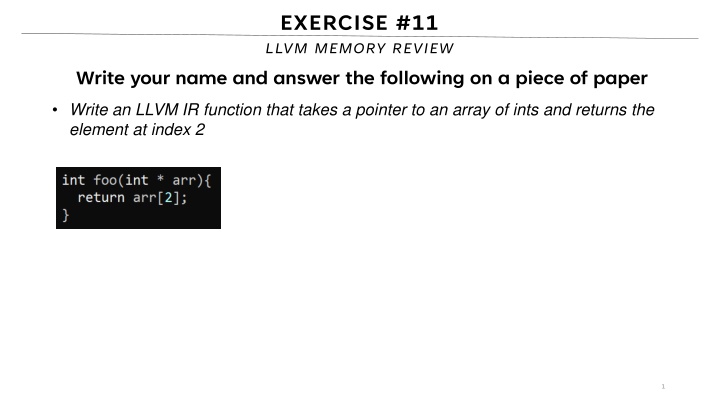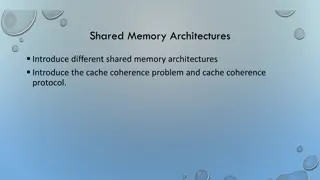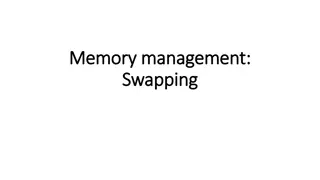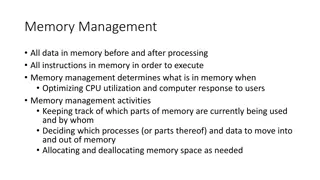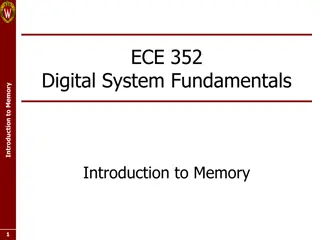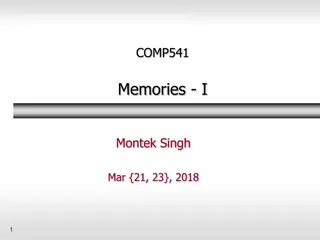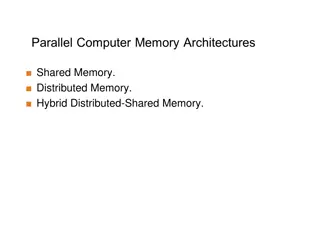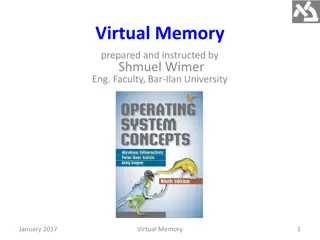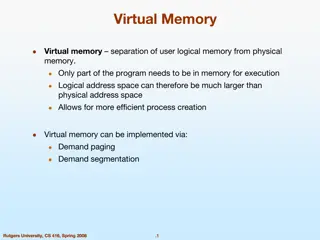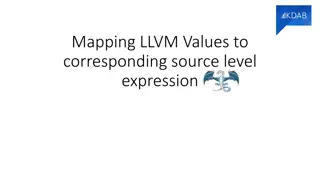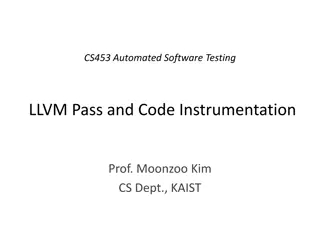LLVM Memory Review and Function Example
In this exercise, an LLVM IR function is created to extract the element at index 2 from a pointer to an array of integers. The concept of named memory in LLVM is reviewed, distinguishing between local, global, and constant memory declarations. Additionally, memory access operations like store, load, and getelementptr are discussed.
Download Presentation

Please find below an Image/Link to download the presentation.
The content on the website is provided AS IS for your information and personal use only. It may not be sold, licensed, or shared on other websites without obtaining consent from the author.If you encounter any issues during the download, it is possible that the publisher has removed the file from their server.
You are allowed to download the files provided on this website for personal or commercial use, subject to the condition that they are used lawfully. All files are the property of their respective owners.
The content on the website is provided AS IS for your information and personal use only. It may not be sold, licensed, or shared on other websites without obtaining consent from the author.
E N D
Presentation Transcript
EXERCISE #11 LLVM MEMORY REVIEW Write your name and answer the following on a piece of paper Write an LLVM IR function that takes a pointer to an array of ints and returns the element at index 2 1
LLVM CALLS EECS 677: Software Security Evaluation Drew Davidson
4 CLASS PROGRESS WE RE BASICALLY READY TO DO STATIC ANALYSIS
5 LAST TIME: LLVM MEMORY REVIEW: LAST LECTURE DESCRIBEDLLVM S CONCEPTOF NAMED MEMORY No mathematical relationship between distinct named memory items Guaranteed mathematical relation WITHIN named memory items (as exploited by GEP) DECLARINGMEMORY Local memory: %ptrL = alloca i32, align 4 Global memory: @ptrG = global i32 2, align 4 (Global) constant: Guaranteed mathematical relation @ptrC = constant i32 2, align 4 %ptrLarr = alloca [8 x i32], align 4 %ptrGstruct = global i32 {i32, i8}, align 4 @ptrCstructs = constant [2 x {i8, i32}] [{i8, i32} {i8 1, i32 2}, {i8, i32}{ i8 3, i32 4} ] , align 4
6 LAST TIME: LLVM MEMORY REVIEW: LAST LECTURE DECLARINGMEMORY Local memory: %ptrL = alloca i32, align 4 Global memory: @ptrG = global i32 2, align 4 (Global) constant: Guaranteed mathematical relation @ptrC = constant i32 2, align 4 %ptrLarr = alloca [8 x i32], align 4 %ptrGstruct = global i32 {i32, i8}, align 4 @ptrCstructs = constant [2 x {i8, i32}] [{i8, i32} {i8 1, i32 2}, {i8, i32}{ i8 3, i32 4} ] , align 4 ACCESSINGMEMORY Store scalar: store i32 1, i32* %ptrL Global memory: %reg = load i32, i32* @ptrG Load index of aggregate type %eltPtr = getelementptr [2 x {i8, i32}], [2 x {i8, i32}]* @ptrCstructs, i64 0, i64 0, i32 1 %res = load i32, i32* %ret
7 FOLLOW-UP WHAT IS THE #0 HERE? REVIEW: LAST LECTURE It s an alias for an attribute list
LECTURE OUTLINE A little more GEP intuition Function calls
9 SOME TIME WITH GEP LLVM BITCODE
10 GETELEMENTPTR LLVM BITCODE
11 WRITING INTERESTING PROGRAMS LLVM BITCODE WECANNOWWRITE TURINGCOMPLETEPROGRAMS BUTTHESEPROGRAMSAREVERY BORING! We need to interact with external functionality
12 LLVM CALLS LLVM BITCODE GENERALSYNTAX call <callee sig> <function name> ( <argList> ) %res = call i32(i32,i32) @max (i32 1, i32 2) Somewhat surprisingly, does not (always) require the full function signature of the callee! CONSTRAINED SYNTAX call <return type> <function name> ( <argList> ) %res = call i32 @max (i32 1, i32 2) The general syntax IS required if a function has varargs %len = call i32 (i8*, ...) @printf(i8* %strPtr, i32 123)
13 LLVM EXTERNAL CALLS LLVM BITCODE EXAMPLE %len = call i32 (i8*, ...) @printf(i8* %strPtr, i32 123)
14 LLVM ATOI LLVM BITCODE TOTHE TERMINAL!
15 LLVM PRINTF LLVM BITCODE TOTHE TERMINAL!
16 RUNNING THE LLVM TOOLS: CLANG LLVM BITCODE clang -S -emit-llvm foo.c -o foo.ll -disable-O0-optnone
17 RUNNING THE LLVM TOOLS: OPT LLVM BITCODE opt -dot-cfg foo.ll -disable-output
19 NEXT TIME WRITING AN ANALYSIS
